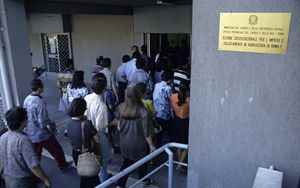(Finance) – In the European Union, the minimum wage has already been introduced in 21 of the 27 Member States, but Italy has not yet implemented this reform. Among the EU countries, the minimum wage does not exist, as well as in Italy, even in Denmark, Cyprus, Austria, Finland and Sweden, here wages are governed by national collective agreements.
What is the minimum wage?
The minimum wage is the basic wage for workers of different categories, established by law, over a given period of time. It cannot be reduced in any way by collective agreements or private contracts. In essence, it is a “limit threshold” of wages below which the employer cannot go down.
How is the minimum wage fixed?
Minimum wage legislation, in various European and non-European countries, has calculated the minimum wage in the light of a series of parameters such as: productivity; the GDP; the Consumer Price Index; general economic trend.
Periodically, a revaluation must be made in order to keep the purchasing power of wages stable over time.
What is the European minimum wage in the individual countries?
According to the most recent statistics published by Eurostat, as of July 2020, national minimum wages were expected in 21 of the 27 EU Member States with significant differences between Member States in the monthly amount. For example, they range from 312 euros in Bulgaria to 2,142 euros in Luxembourg.
There is currently no national or regional law on the minimum wage in Italy. Why has our country not yet implemented this reform?
Historically, Italy is a country where the debate in the world of work is so complex both for the motivations on the part of the actors, and for the structural difficulties that our country suffers in terms of decision-making. We might think – he says Beniamino Bedusa, president of Great Place to Work Italia – that the country has not yet engaged in a serious discussion on this reform since the risk would be that of to exempt trade unions and social partners from the debate. Furthermore, introducing a minimum wage would jeopardize the balance of the countless national collective agreements enjoyed by work in Italy.
Another substantial theme – adds Bedusa – is also theimpact that the minimum wage could have on the employment rate. How much could the increase in the cost of labor actually be amortized by the Italian small and medium-sized enterprises that represent a large part of the productive fabric of our country? What could the government do to remedy these increases?
Finally, taking up some of what we have said, our labor market would not be free from the risks of incorrect application of the reform. The same companies, perhaps, could just go and apply a minimum wage contract instead of the reference CCNL precisely to amortize those costs that are also burdensome for company budgets.
What role could the minimum wage play on employee well-being and business organization?
We start from the assumption that, from our analyzes and those of other companies, salary, while representing a lever of satisfaction, is not the first motivational driver – explains the president of Great Place to Work Italia -. Indeed, it would seem that there is a misalignment as regards the perception of the importance of remuneration between management and workers, where the former perceive this as the most important lever for collaborators while the latter consider the relational aspects to be fundamental.

Also from some studies carried out on the German labor market following the introduction of the minimum wage in 2015it emerged that “the influence of minimum wage on personal satisfaction is modest and that its effect on work engagement and intentional turnover is virtually zero”.
However, it should be noted that the inclusion of a minimum wage for specific categories of workers would lead them to go beyond the conditions of poverty. It is right, therefore, that poverty is not a problem for those who work every day, full time.
Furthermore – underlines the top manager – we also think of the new market segments, the gig economy, all those atypical contracts present today in the world of work, which do not guarantee in the first instance to the actors involved specific protections, including wages. .
What are the pros and cons of the minimum wage?
In addition to the factors already mentioned above, we can also say that over time it could generate a modest virtuous circle that strengthens the relationship between the parties and that it increases the productivity of human capital, Bedusa points out. The central point – and Confindustria also reminds us, in favor of a discussion table on this topic – is not so much the question of how important is the introduction of a minimum wage today in our labor market, but how to determine its implementation and related application controls.
On the other hand – adds Bedusa – the risk would be precisely that of strengthening those alternative contracts, pirate (which reproduce the contracts stipulated by the trade unions but with wage dumping and job protection) or even to feed even more illegal work.
Furthermore, an unweighted maneuver on the minimum wage could lead to a stiffening of the labor market which is now more flexible than ever and to outsourcing abroad by organizations to amortize the increase in the high costs of Italian labor. In this regard, it is important to remember that Italy is the fourth country in Europe by tax wedge.
Finally, one might expect, for those who belong to higher wage levels and who find themselves crushed by the wage increase of the lower brackets, a request for wage repositioning, with a further indirect increase in the cost of labor, given by the introduction of the minimum wage.
In Germany comes the increase in the minimum wage. What do you think of that job market?
In Germany, the possibility of a second increase in the minimum wage is being discussed. The first had already occurred in 2015, with the introduction of an hourly wage of 8.50 euros gross. The fact that today we are discussing to bring it to 12 euros per hour, an increase of 42%, makes us understand how this issue is very important for the Germans.
On the other hand – explains the president of Great Place to Work Italia – Germany is, and remains, one of the countries with the strongest labor market and one of the lowest unemployment rates in the world. This, however, should not deceive us that there are no structural problems in the German labor market as well. Suffice it to say that Germany still has a large wage gap today (the share of full-time workers earning less than 2/3 of the average wage is between 18 and 19%, above 15% of the EU average), considerable inflation (4.9%) and a very large slice of part-time workers (26.8%, 8 percentage points above the Italian average) which on the one hand certainly favor a on the other hand, they stimulate a rethink of the minimum wage.
